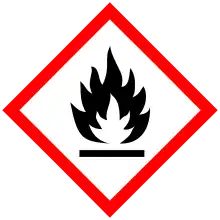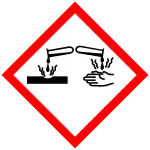 | |
| Names | |
|---|---|
| IUPAC name
N,N-bis(prop-2-enyl)prop-2-en-1-amine | |
| Identifiers | |
3D model (JSmol) |
|
| ChEMBL | |
| ChemSpider | |
| ECHA InfoCard | 100.002.772 |
| EC Number |
|
PubChem CID |
|
| RTECS number |
|
| UNII | |
| UN number | 2610 |
CompTox Dashboard (EPA) |
|
| |
| |
| Properties | |
| C9H15N | |
| Molar mass | 137.226 g·mol−1 |
| Appearance | colorless liquid |
| Density | 0.809 g/cm3 |
| Boiling point | 155.5 °C (311.9 °F; 428.6 K) |
| Hazards | |
| GHS labelling:[1] | |
    | |
| Danger | |
| H226, H302, H311, H312, H314, H331, H332, H412 | |
| P210, P233, P240, P241, P242, P243, P260, P261, P264, P270, P271, P273, P280, P301+P317, P301+P330+P331, P302+P352, P302+P361+P354, P303+P361+P353, P304+P340, P305+P354+P338, P316, P317, P321, P330, P361+P364, P362+P364, P363, P370+P378, P403+P233, P403+P235, P405, P501 | |
Except where otherwise noted, data are given for materials in their standard state (at 25 °C [77 °F], 100 kPa).
Infobox references | |
Triallylamine is the organic compound with the formula N(CH2CH=CH2)3. It is a colorless liquid with an ammonia-like odor. It is multifunctional, featuring a tertiary amine and three alkene groups. Triallylamine (and mono- and diallyl amines) is produced by the treating allyl chloride with ammonia.[2]
Allylamines have particularly weak α-CH bonds, being near 80 kcal/mol.[3]
Related compounds
References
- ↑ "Triallylamine". pubchem.ncbi.nlm.nih.gov. Retrieved 3 April 2022.
- ↑ Eller, Karsten; Henkes, Erhard; Rossbacher, Roland; Höke, Hartmut (2000). "Amines, Aliphatic". Ullmann's Encyclopedia of Industrial Chemistry. Weinheim: Wiley-VCH. doi:10.1002/14356007.a02_001. ISBN 978-3527306732.
- ↑ Dombrowski, G. W.; Dinnocenzo, J. P.; Farid, S.; Goodman, J. L.; Gould, I. R. (1999). "Α-C−H Bond Dissociation Energies of Some Tertiary Amines". The Journal of Organic Chemistry. 64 (2): 427–431. doi:10.1021/JO9813843.
This article is issued from Wikipedia. The text is licensed under Creative Commons - Attribution - Sharealike. Additional terms may apply for the media files.